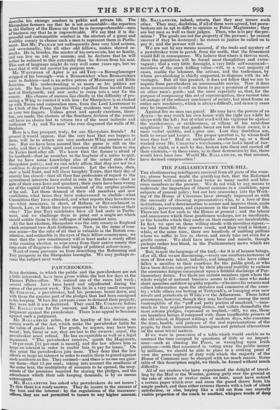PAWNBROKERS.
SOME decisions, in which the public and the pawnbrokers are not a little interested, have been given within the last few days at the Thames Police-office. We noticed one of the cases last week ; several others have been heard and adjudicated during the course of the present week. The facts lie in a very small compass. Mr. CORDING, a pawnbroker, bad his premises burnt down, and with them the greater part of the pledges that had been consigned to his keeping. When the pawners came to demand their property, they were told it was destroyed. They sued Mr. CORDING before Mr. BALLAr.TINE for the amount, and Mr. BALLANTINE gave judgment against the pawnbroker. There is no appeal to Sessions against such a judgment. Mr. BALLANTINE relies, for the legality of his decision, on certain words of the Act, which make the pawnbroker liable for the value of goods lost. The goods, he argues, may have been burnt; but, burnt or not, they are lost to the owners' arga/,' the pawnbroker must refund. He has an equitable as well as a legal argument. "The pawnbroker receives, quoth the Magistrate, "20-per cent. [12 per cent. is meant], and the law allows him so large an interest in order to enable him to pay for losses." On this point the pawnbrokers join issue. They deny that the law allows so large an interest in order to enable them to guard against such accidents as fire. They contend—and there is no one can gain- say them—that 12 per cent., taking into account the smallness of • the sums lent, the multiplicity of accounts to be opened, the mag- nitude of the premises required for storing the pledges, and the • attendance which 'their safe keeping demands, is by no means 'extravagant. Mr. BALLANTINE has asked why pawnbrokers do not insure ? To this there is a ready answer. They do insure to the amount of the loan and the interest : by the regulations of the insurance 'office, they are not permitted to insure to any higher amount. Mr. BALLANTINE, indeed, retorts, that they may insure each other. They may, doubtless, if all of them were agreed, but pawn- brokers are as apt to differ in opinion as Police Magistrates ; they are but men as well as their judges. Then, who is to pay the pre- mium? The goods are not the property of the pawnee ; he cannot recover if they be destroyed ; he cannot in justice be called on to pay it; and the pawner will not.
We are not by any means assured, if the trade and mystery of a pawnbroker were to perish from the earth, that the firmament would fall in consequence. We believe that where it thrives most, there the population will be found most thoughtless and extra- vagant; that a very little foresight, a very little self-command--- sacrifices of the most trifling value—will, in a vast majority of cases, enable the labourer, the artisan, and the tradesman, by whom pawnbroking is chiefly supported, to dispense with its ad- vantages. But all this granted, it does not follow that we are to require from pawnbrokers an unreasonable service. Now it does seem unreasonable to call on them to pay a premium of insurance on other men's goods; and the more especially so, that, for the purpose of compassing this act of supererogation, they cannot take advantage of the ordinary machinery of society, but must frame an entire new machinery, which is always difficult, and in many cases may be impossible.
Against fire no man can guard. He may have the powers of an Argus—he may watch his own house with the right eye while he sleeps with the left ; but of what avail will his vigilance be against the carelessness, or recklessness, or villany of his next-door neighbour ? To say that goods burnt are lost to their owner, is a mere verbal quibble, and a or one. Lost they doubtless are, both to owner and keeper. The proper question is, by whose fault were they lost? Had an earthquake swallowed up, or a flood washed away Mr. CORDING'S warehouses,—or had a band of bur- glars by night, or a mob by day, broken into them and carried off their contents,--in these cases, as in their destruction by fire, there would have been loss. Would Mr. BALLANTINE, on that account, have decreed compensation ?


























 Previous page
Previous page